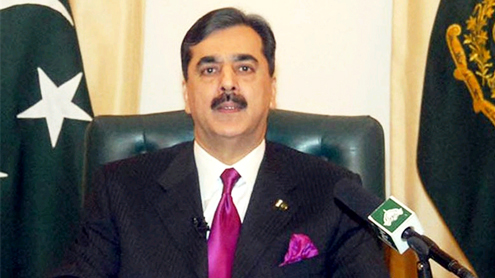 For reasons that are not entirely clear, Prime Minister (PM) Yousaf Raza Gilani interacted with journalists in Islamabad the other day to deliver his thoughts on a whole range of issues. In the event, the PM’s statements made for column space and broadcast time, without necessarily saying anything new or terribly enlightening. The one exception to this general character of the interaction could be considered to be the PM’s response to the Supreme Court’s (SC’s) order of March 8, in which the SC had directed the PM to write the letter to the Swiss authorities regarding money laundering and corruption allegations that could affect President Asif Ali Zardari. The PM appeared to be unclear in which case the SC wanted him to write a letter to the Swiss authorities and said he would respond after consulting his counsel. In most people’s mind there is no confusion, however. It is the Cotecna case that is under discussion. The SC had fixed March 21 as the deadline for the PM to inform the court whether he had complied with its order to implement the earlier judgement in the NRO case. In a related development, the SC’s March 8 order has been conveyed to the PM through the Attorney General. March 21 therefore is crunch time for the PM to comply with the SC’s directive or face possible conviction for contempt of court. While consultation with counsel seems appropriate, it is not clear at this point what the outcome, and response, will be.
For reasons that are not entirely clear, Prime Minister (PM) Yousaf Raza Gilani interacted with journalists in Islamabad the other day to deliver his thoughts on a whole range of issues. In the event, the PM’s statements made for column space and broadcast time, without necessarily saying anything new or terribly enlightening. The one exception to this general character of the interaction could be considered to be the PM’s response to the Supreme Court’s (SC’s) order of March 8, in which the SC had directed the PM to write the letter to the Swiss authorities regarding money laundering and corruption allegations that could affect President Asif Ali Zardari. The PM appeared to be unclear in which case the SC wanted him to write a letter to the Swiss authorities and said he would respond after consulting his counsel. In most people’s mind there is no confusion, however. It is the Cotecna case that is under discussion. The SC had fixed March 21 as the deadline for the PM to inform the court whether he had complied with its order to implement the earlier judgement in the NRO case. In a related development, the SC’s March 8 order has been conveyed to the PM through the Attorney General. March 21 therefore is crunch time for the PM to comply with the SC’s directive or face possible conviction for contempt of court. While consultation with counsel seems appropriate, it is not clear at this point what the outcome, and response, will be.
The PM also dilated on other issues, amongst which the Balochistan situation figured. The PM revealed that he had spoken to the CJCSC, COAS and ISI chief along with other officials to mediate the mutual recriminations between the FC and the provincial government of Balochistan. The FC stands accused of atrocities in Balochistan, but has in turn been placing the blame for the poor law and order situation in the province on Chief Minister Nawab Aslam Raisani’s government. The PM revealed that he had asked the security and law enforcement agencies to cooperate with the provincial government. How far this request will be acceded to remains to be seen, since to date the FC and intelligence agencies are accused of running a parallel government in the province, a course that has yielded a fair crop of tortured, mutilated, bullet-riddled bodies of Baloch political workers, intellectuals, and others. On the issue of calling an All Parties Conference or jirga on Balochistan, the PM left the matter dangling in the air by saying he was consulting the Balochistan government on the matter. Realistically, Aslam Raisani’s government is in no position to persuade the senior leaders, exiled elements and those fighting in the mountains to participate in ay such gathering as the trust deficit between the nationalists and Quetta is hopelessly unbridgeable in the presence of the ‘kill and dump’ policy. Unless the FC is withdrawn and the phenomenon of dumped dead bodies ceases, talk of talks is so much pie in the sky.
The PM in answer to questions stated that a cabinet reshuffle, which has been speculated on in the media in recent days, couldn’t be ruled out. The PM would be advised in the interests of his government to get rid of non-performing deadwood ministers and bring dynamic faces forward to tackle what he defined as the biggest challenges facing the government, amongst which pride of place belongs to the energy crisis, extremism and terrorism. He also promised to remove the heads of loss-making state-owned enterprises. Amongst the achievements of his government, the PM listed passing amendments to the constitution without even a simple majority, not holding any political detainees and avoiding political victimisation. These are no doubt considerable pluses, but the PM failed to exercise self-criticism on the failures of his government, particularly in its handling of the economy and being able to persuade the military establishment to review its proxy war strategy vis-à-vis Afghanistan. These are major failures that will come back to haunt the PPP in the next general elections. – Dailytimes











